J. Bradford DeLong's Blog, page 395
March 4, 2018
William Jennings Bryan (1896): Cross of Gold: Weekend Reading

Should-Read: William Jennings Bryan (1896): Cross of Gold: "I would be presumptuous, indeed, to present myself against the distinguished gentlemen to whom you have listened if this were but a measuring of ability...
...But this is not a contest among persons.
The humblest citizen in all the land when clad in the armor of a righteous cause is stronger than all the whole hosts of error that they can bring. I come to speak to you in defense of a cause as holy as the cause of liberty���the cause of humanity. When this debate is concluded, a motion will be made to lay upon the table the resolution offered in commendation of the administration and also the resolution in condemnation of the administration. I shall object to bringing this question down to a level of persons. The individual is but an atom; he is born, he acts, he dies; but principles are eternal; and this has been a contest of principle.
Never before in the history of this country has there been witnessed such a contest as that through which we have passed. Never before in the history of American politics has a great issue been fought out as this issue has been by the voters themselves.
On the 4th of March, 1895, a few Democrats, most of them members of Congress, issued an address to the Democrats of the nation asserting that the money question was the paramount issue of the hour; asserting also the right of a majority of the Democratic Party to control the position of the party on this paramount issue; concluding with the request that all believers in free coinage of silver in the Democratic Party should organize and take charge of and control the policy of the Democratic Party.
Three months later, at Memphis, an organization was perfected, and the silver Democrats went forth openly and boldly and courageously proclaiming their belief and declaring that if successful they would crystallize in a platform the declaration which they had made; and then began the conflict with a zeal approaching the zeal which inspired the crusaders who followed Peter the Hermit. Our silver Democrats went forth from victory unto victory, until they are assembled now, not to discuss, not to debate, but to enter up the judgment rendered by the plain people of this country.
But in this contest, brother has been arrayed against brother, and father against son. The warmest ties of love and acquaintance and association have been disregarded. Old leaders have been cast aside when they refused to give expression to the sentiments of those whom they would lead, and new leaders have sprung up to give direction to this cause of freedom. Thus has the contest been waged, and we have assembled here under as binding and solemn instructions as were ever fastened upon the representatives of a people.
We do not come as individuals. Why, as individuals we might have been glad to compliment the gentleman from New York [Senator Hill], but we knew that the people for whom we speak would never be willing to put him in a position where he could thwart the will of the Democratic Party. I say it was not a question of persons; it was a question of principle; and it is not with gladness, my friends, that we find ourselves brought into conflict with those who are now arrayed on the other side. The gentleman who just preceded me [Governor Russell] spoke of the old state of Massachusetts. Let me assure him that not one person in all this convention entertains the least hostility to the people of the state of Massachusetts.
But we stand here representing people who are the equals before the law of the largest cities in the state of Massachusetts. When you come before us and tell us that we shall disturb your business interests, we reply that you have disturbed our business interests by your action. We say to you that you have made too limited in its application the definition of a businessman. The man who is employed for wages is as much a businessman as his employer. The attorney in a country town is as much a businessman as the corporation counsel in a great metropolis. The merchant at the crossroads store is as much a businessman as the merchant of New York. The farmer who goes forth in the morning and toils all day, begins in the spring and toils all summer, and by the application of brain and muscle to the natural resources of this country creates wealth, is as much a businessman as the man who goes upon the Board of Trade and bets upon the price of grain. The miners who go 1,000 feet into the earth or climb 2,000 feet upon the cliffs and bring forth from their hiding places the precious metals to be poured in the channels of trade are as much businessmen as the few financial magnates who in a backroom corner the money of the world.
We come to speak for this broader class of businessmen. Ah. my friends, we say not one word against those who live upon the Atlantic Coast; but those hardy pioneers who braved all the dangers of the wilderness, who have made the desert to blossom as the rose���those pioneers away out there, rearing their children near to nature���s heart, where they can mingle their voices with the voices of the birds���out there where they have erected schoolhouses for the education of their children and churches where they praise their Creator, and the cemeteries where sleep the ashes of their dead���are as deserving of the consideration of this party as any people in this country.
It is for these that we speak. We do not come as aggressors. Our war is not a war of conquest. We are fighting in the defense of our homes, our families, and posterity. We have petitioned, and our petitions have been scorned. We have entreated, and our entreaties have been disregarded. We have begged, and they have mocked when our calamity came.
We beg no longer; we entreat no more; we petition no more. We defy them!
The gentleman from Wisconsin has said he fears a Robespierre. My friend, in this land of the free you need fear no tyrant who will spring up from among the people. What we need is an Andrew Jackson to stand as Jackson stood, against the encroachments of aggregated wealth.
They tell us that this platform was made to catch votes. We reply to them that changing conditions make new issues; that the principles upon which rest Democracy are as everlasting as the hills; but that they must be applied to new conditions as they arise. Conditions have arisen and we are attempting to meet those conditions. They tell us that the income tax ought not to be brought in here; that is not a new idea. They criticize us for our criticism of the Supreme Court of the United States. My friends, we have made no criticism. We have simply called attention to what you know. If you want criticisms, read the dissenting opinions of the Court. That will give you criticisms.
They say we passed an unconstitutional law. I deny it. The income tax was not unconstitutional when it was passed. It was not unconstitutional when it went before the Supreme Court for the first time. It did not become unconstitutional until one judge changed his mind; and we cannot be expected to know when a judge will change his mind.
The income tax is a just law. It simply intends to put the burdens of government justly upon the backs of the people. I am in favor of an income tax. When I find a man who is not willing to pay his share of the burden of the government which protects him, I find a man who is unworthy to enjoy the blessings of a government like ours.
He says that we are opposing the national bank currency. It is true. If you will read what Thomas Benton said, you will find that he said that in searching history he could find but one parallel to Andrew Jackson. That was Cicero, who destroyed the conspiracies of Cataline and saved Rome. He did for Rome what Jackson did when he destroyed the bank conspiracy and saved America.
We say in our platform that we believe that the right to coin money and issue money is a function of government. We believe it. We believe it is a part of sovereignty and can no more with safety be delegated to private individuals than can the power to make penal statutes or levy laws for taxation.
Mr. Jefferson, who was once regarded as good Democratic authority, seems to have a different opinion from the gentleman who has addressed us on the part of the minority. Those who are opposed to this proposition tell us that the issue of paper money is a function of the bank and that the government ought to go out of the banking business. I stand with Jefferson rather than with them, and tell them, as he did, that the issue of money is a function of the government and that the banks should go out of the governing business.
They complain about the plank which declares against the life tenure in office. They have tried to strain it to mean that which it does not mean. What we oppose in that plank is the life tenure that is being built up in Washington which establishes an office-holding class and excludes from participation in the benefits the humbler members of our society....
Let me call attention to two or three great things.
The gentleman from New York says that he will propose an amendment providing that this change in our law shall not affect contracts which, according to the present laws, are made payable in gold. But if he means to say that we cannot change our monetary system without protecting those who have loaned money before the change was made, I want to ask him where, in law or in morals, he can find authority for not protecting the debtors when the act of 1873 was passed when he now insists that we must protect the creditor. He says he also wants to amend this platform so as to provide that if we fail to maintain the parity within a year that we will then suspend the coinage of silver. We reply that when we advocate a thing which we believe will be successful we are not compelled to raise a doubt as to our own sincerity by trying to show what we will do if we are wrong.
I ask him, if he will apply his logic to us, why he does not apply it to himself. He says that he wants this country to try to secure an international agreement. Why doesn���t he tell us what he is going to do if they fail to secure an international agreement. There is more reason for him to do that than for us to expect to fail to maintain the parity. They have tried for thirty years���thirty years���to secure an international agreement, and those are waiting for it most patiently who don���t want it at all.
Now, my friends, let me come to the great paramount issue. If they ask us here why it is we say more on the money question than we say upon the tariff question, I reply that if protection has slain its thousands the gold standard has slain its tens of thousands. If they ask us why we did not embody all these things in our platform which we believe, we reply to them that when we have restored the money of the Constitution, all other necessary reforms will be possible, and that until that is done there is no reform that can be accomplished.
Why is it that within three months such a change has come over the sentiments of the country? Three months ago, when it was confidently asserted that those who believed in the gold standard would frame our platforms and nominate our candidates, even the advocates of the gold standard did not think that we could elect a President; but they had good reasons for the suspicion, because there is scarcely a state here today asking for the gold standard that is not within the absolute control of the Republican Party.
But note the change.
Mr. McKinley was nominated at St. Louis upon a platform that declared for the maintenance of the gold standard until it should be changed into bimetallism by an international agreement. Mr. McKinley was the most popular man among the Republicans; and everybody three months ago in the Republican Party prophesied his election. How is it today? Why, that man who used to boast that he looked like Napoleon, that man shudders today when he thinks that he was nominated on the anniversary of the Battle of Waterloo. Not only that, but as he listens he can hear with ever increasing distinctness the sound of the waves as they beat upon the lonely shores of St. Helena.
Why this change? Ah, my friends, is not the change evident to anyone who will look at the matter? It is because no private character, however pure, no personal popularity, however great, can protect from the avenging wrath of an indignant people the man who will either declare that he is in favor of fastening the gold standard upon this people, or who is willing to surrender the right of self-government and place legislative control in the hands of foreign potentates and powers....
We go forth confident that we shall win. Why? Because upon the paramount issue in this campaign there is not a spot of ground upon which the enemy will dare to challenge battle.
Why, if they tell us that the gold standard is a good thing, we point to their platform and tell them that their platform pledges the party to get rid of a gold standard and substitute bimetallism. If the gold standard is a good thing, why try to get rid of it? If the gold standard, and I might call your attention to the fact that some of the very people who are in this convention today and who tell you that we ought to declare in favor of international bimetallism and thereby declare that the gold standard is wrong and that the principles of bimetallism are better���these very people four months ago were open and avowed advocates of the gold standard and telling us that we could not legislate two metals together even with all the world.
I want to suggest this truth, that if the gold standard is a good thing we ought to declare in favor of its retention and not in favor of abandoning it; and if the gold standard is a bad thing, why should we wait until some other nations are willing to help us to let it go?
Here is the line of battle. We care not upon which issue they force the fight. We are prepared to meet them on either issue or on both. If they tell us that the gold standard is the standard of civilization, we reply to them that this, the most enlightened of all nations of the earth, has never declared for a gold standard, and both the parties this year are declaring against it. If the gold standard is the standard of civilization, why, my friends, should we not have it? So if they come to meet us on that, we can present the history of our nation. More than that, we can tell them this, that they will search the pages of history in vain to find a single instance in which the common people of any land ever declared themselves in favor of a gold standard. They can find where the holders of fixed investments have.
Mr. Carlisle said in 1878 that this was a struggle between the idle holders of idle capital and the struggling masses who produce the wealth and pay the taxes of the country; and my friends, it is simply a question that we shall decide upon which side shall the Democratic Party fight. Upon the side of the idle holders of idle capital, or upon the side of the struggling masses? That is the question that the party must answer first; and then it must be answered by each individual hereafter. The sympathies of the Democratic Party, as described by the platform, are on the side of the struggling masses, who have ever been the foundation of the Democratic Party.
There are two ideas of government. There are those who believe that if you just legislate to make the well-to-do prosperous, that their prosperity will leak through on those below. The Democratic idea has been that if you legislate to make the masses prosperous their prosperity will find its way up and through every class that rests upon it.
You come to us and tell us that the great cities are in favor of the gold standard. I tell you that the great cities rest upon these broad and fertile prairies. Burn down your cities and leave our farms, and your cities will spring up again as if by magic. But destroy our farms and the grass will grow in the streets of every city in the country.
My friends, we shall declare that this nation is able to legislate for its own people on every question without waiting for the aid or consent of any other nation on earth, and upon that issue we expect to carry every single state in the Union.
I shall not slander the fair state of Massachusetts nor the state of New York by saying that when citizens are confronted with the proposition, ���Is this nation able to attend to its own business?������I will not slander either one by saying that the people of those states will declare our helpless impotency as a nation to attend to our own business. It is the issue of 1776 over again. Our ancestors, when but 3 million, had the courage to declare their political independence of every other nation upon earth. Shall we, their descendants, when we have grown to 70 million, declare that we are less independent than our forefathers? No, my friends, it will never be the judgment of this people. Therefore, we care not upon what lines the battle is fought. If they say bimetallism is good but we cannot have it till some nation helps us, we reply that, instead of having a gold standard because England has, we shall restore bimetallism, and then let England have bimetallism because the United States have.
If they dare to come out in the open field and defend the gold standard as a good thing, we shall fight them to the uttermost, having behind us the producing masses of the nation and the world. Having behind us the commercial interests and the laboring interests and all the toiling masses, we shall answer their demands for a gold standard by saying to them, you shall not press down upon the brow of labor this crown of thorns. You shall not crucify mankind upon a cross of gold.
March 3, 2018
Comment of the Day: Phil Koop: DO NEURAL NETS DREAM OF EL...
Comment of the Day: Phil Koop: DO NEURAL NETS DREAM OF ELECTRIC SHEEP?: "It will always be a minor irritation to me that these ML black-boxes are called 'algorithms'...
...They're the exact opposite of an algorithm! You kind of know what they're going to do, most of the time, but without a huge amount of analysis you've got no idea how they're going to do it-that's what makes it hard to predict failure modes. It would be more reasonable to call them "homunculi" or, for Jack Vance fans like me, "sandestins." Also, get offa my lawn...
Should-Read: Josh Marshall continues to believe that focu...
Should-Read: Josh Marshall continues to believe that focusing on informing his audience���rather than specializing in clickbait or in pleasing one's sources���will acquire an audience willing to pay for good work: Josh Marshall: A Note on TPM, Its Past and its Future: "This is a better model. It���s not just a necessity. It���s affirmatively better...
...We planned ahead. We���re doing fine. And we���re better for it. Publishing history has various examples of advertising-only business models. But they are very much the exception. They mainly exist when there are near monopoly barriers to entry into the market which allow publishers to command and defend robust ad rates. Broadcast television is the best example of this. That was possible in part because of the massive capital required to enter the market but just as much by spectrum scarcity. There are other examples. But they���re definitely the exception. If you���re a member, know that your membership is essential to our vitality and growth. We intend to keep working hard to make it worth your purchase...
Should-Read: Ann Marie Marciarille: The Amazon Threat t...

Should-Read: Ann Marie Marciarille: The Amazon Threat to Kill the Hungry Tapeworm: "Health industry stock analysts and observers have been wondering for some time about Amazon's potential to enter the marketplace for health care goods and services...
...obtained wholesale pharmaceutical distribution licenses in twelve states.... Now... Amazon, Berkshire Hathaway, and JP Morgan have announced their intention to create a multi-employer not for profit health insurance plan/health care provider, it is not only the pharmaceutical sector that is speculating on what all this could mean.... Health care delivery as well as employer sponsored health insurance is contemplated.... We do have a significant historic example of a business person inexperienced in health care delivery and health insurance taking these industries by storm.��That is what Henry Kaiser did, beginning in the Richmond Kaiser shipyards of the 1930's on site and opened for public enrollment in the 1940's.��Henry Kaiser had clear goals: bind his employees to his shipyards with an attractive plan at a time when war time frozen wages could not perform this function and offer better workplace injury care in order to keep wartime production moving... a better workers comp system... moved to employer sponsored health insurance... had an interest in redeeming his mother Mary Kaiser's death at the age of 52 from untreated kidney disease... chronic nephritis.... untreated because she could not afford the care required and Henry, a teenager at the time, could not afford it for her....
One collaborative press release does not an integrated health care delivery/health insurance company make. Even a collaborative press release as wonderful as today's quoting Warren Buffet vowing to help attack the health care costs that are a hungry tapeworm on American business and the American economy raises more questions than it answers...
Should-Read: Supply and demand works for housing markets:...
Should-Read: Supply and demand works for housing markets: add more housing while keeping the desirability of the metropolitan area in the eyes of the well-off constant, and housing prices fall. Of course, more housing and the resulting density can raise the desirability of the metropolitan area in the eyes of the well-off: Mark Belko: As new apartments are built around Pittsburgh, older stock is feeling the pressure: "Pittsburgh is in the midst of a supply surge, with about 4,600 units being built within the last three years...
...more than in the previous 15 years combined. Another 3,479 units are set to be completed in the next two years.... The biggest impact could be on older apartment buildings, which may have a hard time competing, according to the report.... CBRE cited the 2004-built Flats at Southside Works. Occupancy hit 99 percent in 2010 and the average rent peaked at $1.80 a square foot in 2014. Faced with competition from the newer Hot Metal Flats and Southside Works City Apartments, the complex is now 71 percent occupied with rents of $1.73 a square foot, according to the report.... While Walnut Capital hasn���t experience a significant drop in occupancy, it has become an issue among landlords, Mr. Reidbord noted. ���Unless you have something better to offer in the older apartments, you���re going to be subject to competition from new apartments,��� he said...
Should-Read: An oldy now, but a very goody: The treatment...
Should-Read: An oldy now, but a very goody: The treatment of human capital in this paper is inadequate: the benefits of human capital are private to the learner, which I think is wrong, and teachers in rich countries are 50 times as good at getting human capital into the brains of learners as are teachers in poor countries, which I think is wrong. Human capital largely acts as a force multiplier for physical capital. But the underlying lesson is very good: the Solow model can fit quite well if you assume capital production function parameters of a half or more: N. Gregory Mankiw, David Romer, and David Weil (1992): A CONTRIBUTION TO THE EMPIRICS OF ECONOMIC GROWTH: "This paper examines whether the Solow growth model is consistent with the international variation in the standard of living...
...It shows that an augmented Solow model that includes accumulation of human as well as physical capital provides an excellent description of the cross-country data. The paper also examines the implications of the Solow model for convergence in standards of living, that is, for whether poor countries tend to grow faster than rich countries. The evidence indicates that, holding population growth and capital accumulation constant, countries converge at about the rate the augmented Solow model predicts...







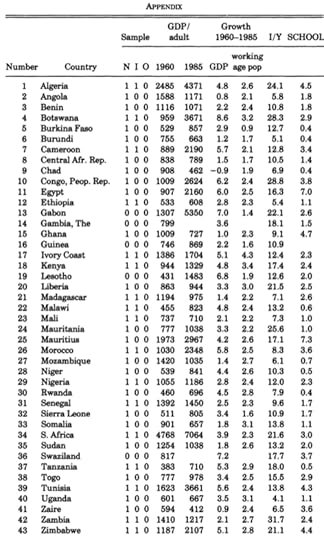
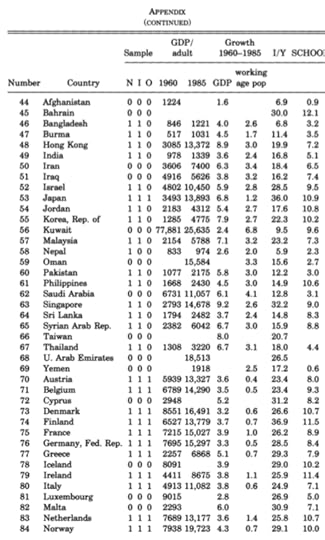
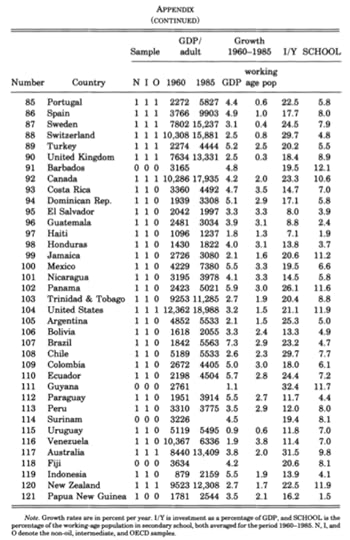
Key: https://www.icloud.com/keynote/07p-pCnwBJHot4XbxnnV3hLlg
This file: http://www.bradford-delong.com/2018/03/should-read-n-gregory-mankiw-david-romer-and-david-weil-1992-a-contribution-to-the-empirics-of-economic-growt.html
Edit this file: http://www.typepad.com/site/blogs/6a00e551f08003883400e551f080068834/post/6a00e551f08003883401b8d2dedf7b970c/edit
Should-Read: Greg Leiserson: U.S. Inequality and Recent T...
Should-Read: Greg Leiserson: U.S. Inequality and Recent Tax Changes: "Distribution tables provide a first-order approximation to the change in welfare...
...Change in welfare determined primarily by changes outside the agent���s control: mechanical change in tax and changes in relative prices:
Behavioral changes have no first-order impact on the well-being of the person changing behavior
(envelope theorem)
Recipe for constructing distribution tables that are informative about welfare:
compute change in tax liabilities and relative price effects (i.e. incidence assumptions)
exclude behavioral changes reflecting unconstrained, rational choice
include other behavioral changes (easier said than done, esp. when there are quantitatively
important market failures)
Converting dollar change in after-tax income into utility requires an assumption about the marginal utility of income (e.g. 1/after-tax income)
Conceptual difference between individual or family���s marginal utility and social welfare weights
used to evaluate redistributive policies
Policymakers��� desire for distribution tables may not reflect an ex ante desire for information about
welfare impacts, but plausible that the desire for tables excluding behavioral changes/sample families is
an implicit recognition that those changes are different...
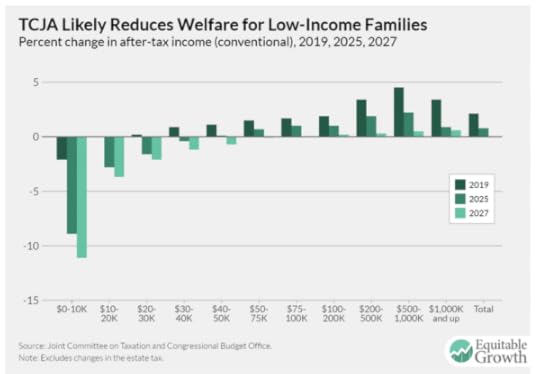
Key: https://www.icloud.com/keynote/0O3-LDYoNHrTDBRw9namRGWhw
This File: http://www.bradford-delong.com/2018/03/should-read-greg-leiserson-us-inequality-and-recent-tax-changeshttpcdnequitablegrowthorgwp-contentuploa.html
Edit This File: http://www.typepad.com/site/blogs/6a00e551f08003883400e551f080068834/post/6a00e551f08003883401b8d2df6b7f970c/edit
Should-Read: If fast-food restaurants in the Susquehanna ...
Should-Read: If fast-food restaurants in the Susquehanna Valley have substantial monopoly power in the labor market���and it really looks like they do���what employers do not? Galbraith on labor unions as countervailing power in conditions of oligopoly did not, IMHO, go nearly far enough: Marshall Steinbaum: A tweetstorm on the recent intellectual history of monopsony: "Oh, one last thing: in... 2010... Syverson touched on the Chicago revolution in antitrust...
...and why it displaced the SCP paradigm, and he said antitrust was where the ideological right wing of economics had been most influential on policy. And I thought "that sounds fishy. Let's put a pin in that and get back to it." Well here we are. I'M BACK:
Monopsony Takes Center Stage
It's Time to Start Thinking of Antitrust Policy as a Labor Market Issue
Antitrust in the Labor Market: Protectionist, or Pro-Competitive?
It���s Time for Antitrust to Take Monopsony Seriously
Should-Read: Very good paper. Nevertheless, the rise in m...
Should-Read: Very good paper. Nevertheless, the rise in monopoly seems to be primarily a post-2000 fact; the rise in inequality, by contrast, is mostly a late 1980s and 1990s fact. So I am not sure that this is the right tree to bark up: Gauti Eggertsson, Jacob A. Robbins, and Ella Getz Wold: Kaldor and Piketty���s Facts: The Rise of Monopoly Power in the United States: "The macroeconomic data of the last thirty years has overturned at least two of Kaldor���s famous stylized growth facts: constant interest rates, and a constant labor share...
...At the same time, the research of Piketty and others has introduced several new and surprising facts: an increase in the financial wealth-to-output ratio in the US, an increase in measured Tobin���s Q, and a divergence between the marginal and the average return on capital. In this paper, we argue that these trends can be explained by an increase in market power and pure profits in the US economy, i.e., the emergence of a non-zero-rent economy, along with forces that have led to a persistent long term decline in real interest rates. We make three parsimonious modifications to the standard neoclassical model to explain these trends. Using recent estimates of the increase in markups and the decrease in real interest rates, we show that our model can quantitatively match these new stylized macroeconomic facts....
(P1) An increase in the financial wealth-to-income ratio despite low savings rates, with a stagnating capital-to-income ratio.
(P2) An increase in Tobin���s Q to a level permanently above 1.
(P3) A decrease in the real rate of interest, while the measured average
return on capital is relatively constant.
(P4)An increase in the pure profit share, with a decrease in the capital and labor share.
(P5) A decrease in investment-to-output, even given historically low borrowing costs and a high value of empirical Tobin���s Q....
The primary goal of this paper is to pursue the hypothesis that changes in monopoly profits, along with forces that have pushed down the natural rate of interest, have been the main driver of a variety of macroeconomic changes over the past forty years. There are a number of reasons why we argue for this hypothesis:
1. there is a wide variety of confirmatory evidence that concentration, profits, and markups have increased over the time period, while the natural rate of interest has decreased
2. it is parsimonious, in the sense that we use two data series (markups and interest rates) to explain the movements of 5 separate trends
3. our model does not generate counterfactual implications...


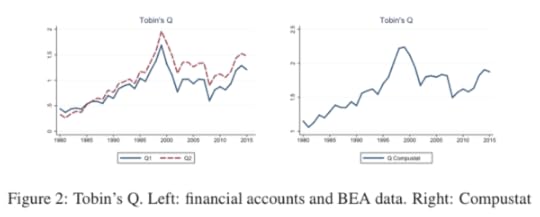

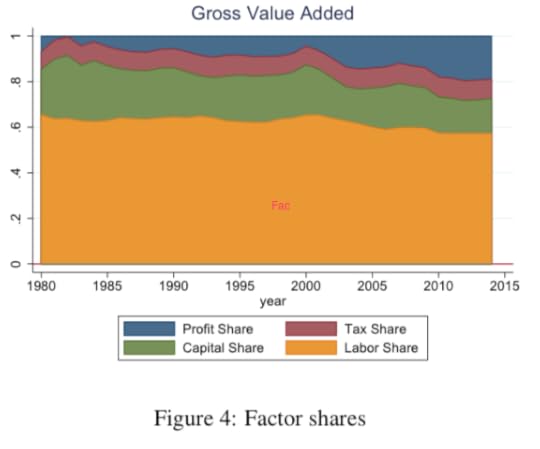
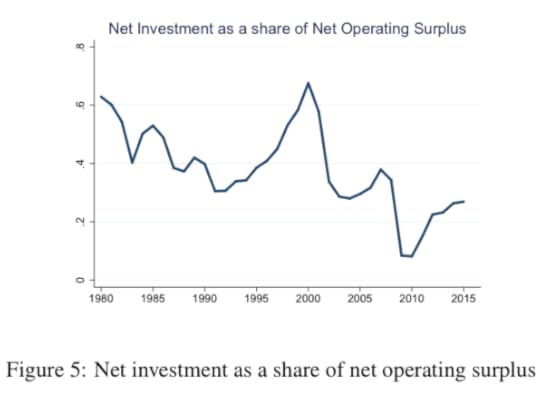

Key: https://www.icloud.com/keynote/0qVxYidBYm_QEQ_3VwbCCQPiA
This File: http://www.bradford-delong.com/2018/03/eggertsson-et-al-kaldor-and-piketty-facts.html
Edit This File: http://www.typepad.com/site/blogs/6a00e551f08003883400e551f080068834/post/6a00e551f08003883401b8d2df6a64970c/edit
March 2, 2018
Should-Read: Journalists as supergrifters, Part CXXV: Jim...
Should-Read: Journalists as supergrifters, Part CXXV: Jim Cramer (2000): The Winners of the New World: "You want winners? You want me to put my Cramer Berkowitz hedge fund hat on...
...and just discuss what my fund is buying today to try to make money tomorrow and the next day and the next? You want my top 10 stocks for who is going to make it in the New World? You know what? I am going to give them to you. Right here. Right now. OK. Here goes. Write them down���no handouts here!: 724 Solutions ( SVNX), Ariba ( ARBA), Digital Island ( ISLD), Exodus ( EXDS), InfoSpace.com ( INSP), Inktomi ( INKT), Mercury Interactive ( MERQ), Sonera ( SNRA), VeriSign ( VRSN) and Veritas Software ( VRTS). We are buying some of every one of these this morning as I give this speech. We buy them every day, particularly if they are down, which, no surprise given what they do, is very rare. And we will keep doing so until this period is over���and it is very far from ending. Heck, people are just learning these stories on Wall Street, and the more they come to learn, the more they love and own! Most of these companies don't even have earnings per share, so we won't have to be constrained by that methodology for quarters to come...
J. Bradford DeLong's Blog
- J. Bradford DeLong's profile
- 90 followers



